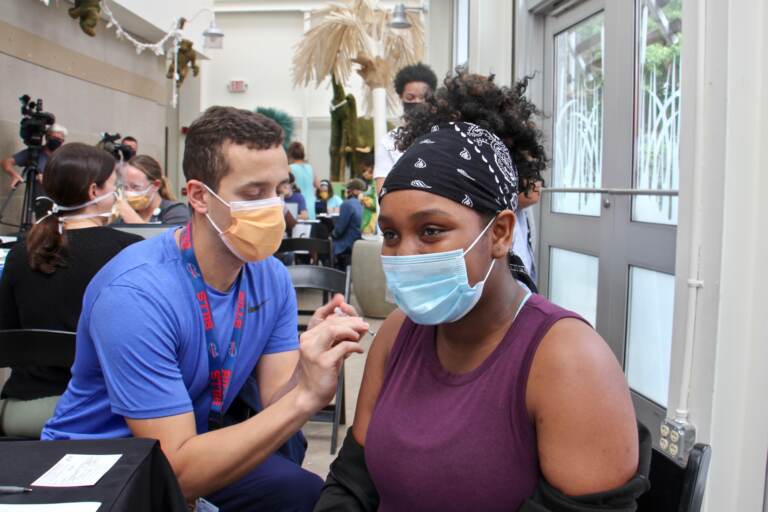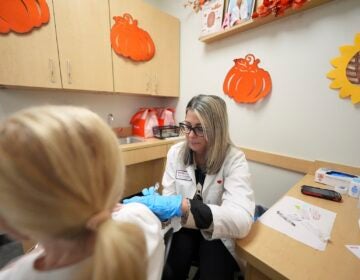Should I get my kids the COVID-19 vaccine booster?
The Pfizer booster is available now to children ages 12 to 15, and immunocompromised kids 5 to 11 can get a third vaccine dose.

Zaliyah Dozier, an 11th grader at Lankenau high School, gets her first shot of the COVID-19 vaccine during a clinic at the Philadelphia Zoo. (Emma Lee/WHYY)
Ask us about COVID-19: What questions do you have about the coronavirus and vaccines?
This is one of a series of articles in which reporters from WHYY’s Health Desk Help Desk answer questions about vaccines and COVID-19 submitted by you, our audience.
Kids between the ages of 12 and 15 are now eligible to get the Pfizer COVID-19 booster, and children ages 5 to 11 can get a third dose of the vaccine if they’re immunocompromised. The Centers for Disease Control and Prevention approved the shots earlier this month.
How much demand there will be for pediatric boosters is yet to be seen, however. Children are among the most unvaccinated people in the United States, along with young adults.
In Pennsylvania excluding Philadelphia, which is a separate vaccine jurisdiction, about 24% of 5- to 9-year-olds, more than 38% of 10- to 14-year-olds, and more than 54% of 15- to 19-year-olds have had at least one dose of the vaccine. In Philadelphia, about 30% of 5- to 11-year-olds and about 56% of 12- to 17-year-olds have had at least one dose.
In Delaware, more than 61% of 12- to 17-year-olds and more than 25% of 5- to 11-year-olds have received at least one dose of the vaccine. And in New Jersey, more than 31% of 5- to 11-year-olds and more than 63% of 12- to 15-year-olds have had at least one dose.
Boosters are important, physicians in this region say, but it’s more pressing to get unvaccinated kids vaccinated. The current vaccination rate falls too short of what’s needed to protect children, doctors say.
“I was on inpatient a couple of weeks ago … and every single kid I had who had COVID was unvaccinated — some of them because they were too young, but some of them were older and could have been vaccinated, but their parents chose not to, and they either were coming in with COVID, respiratory problems like pneumonia, or the multisystem inflammatory disease some weeks after having had COVID and were seriously ill,” said Dr. Jonathan Miller, medical director of value-based care and chief of primary care at Nemours Children’s Health in the Delaware Valley.
“And most of those families afterwards were going to go get their kids vaccinated,” he said. “So sort of the experience of living through the reality of what it can do to you quickly changes people’s minds, and I wish we could get to that before something like that happens.”
Dr. Paul Offit, director of the Vaccine Education Center and an attending physician in the Division of Infectious Diseases at Children’s Hospital of Philadelphia, said the conversation should be around getting kids vaccinated in the first place. CHOP too, is seeing hospitalizations for COVID-19 among unvaccinated children, he said.
“We’re not going to boost our way out of this pandemic. We’re not going to test our way out of this pandemic. The only way out of this pandemic is vaccination … until we figure out how to get young people, including children vaccinated, we are going to continue to suffer this pandemic, at least on [an] every winter basis,” Offit said.
“When the virus first came into this country in January of 2020, the mantra was that children get infected less frequently, and when they’re infected, they’re connected less severely. That’s true. But that doesn’t mean that children can’t be infected and be severely infected. And that’s what we’re seeing now, because they’re a susceptible group, because they’re an under-vaccinated group, or unvaccinated group, as compared to our older citizens,” Offit said.
“You’re now seeing a virus like this, omicron, select them out. And so now we’re seeing hospitals that are in many ways overwhelmed with children who suffer this disease. They don’t have to suffer it,” he said. “There are vaccines available for those over 5, and a choice not to get a vaccine is not a risk-free choice. It’s just a choice to take a different and more serious risk. So please get your children vaccinated.”
If your kids already are vaccinated, however, you may have some questions about what the recent CDC recommendation means. Here’s what you need to know about the pediatric booster.
Who is eligible and why?
Kids between 12 and 15 who have received two doses of the pediatric Pfizer COVID-19 vaccine are eligible for a booster. That’s because in people of all ages the immunity conferred by vaccines wanes over time. The currently available COVID vaccines, while they do still protect against serious illness, are less effective at preventing mild illness against omicron compared to other coronavirus variants.
Children ages 5 to 11 who are immunocompromised and have had two doses of the Pfizer vaccine are eligible for a third dose. An additional dose is different from a booster. Data shows many immunocompromised people do not produce sufficient antibodies even after the first two doses. However, studies show antibodies do increase after getting an additional dose.
Is the booster different?
The Pfizer booster for kids 12 and up is the same dosage as the first two shots. The dosage for 5- to 11-year-olds is one-third that given to older kids and adults.
When are they eligible?
Adolescents 12 and older can get their booster five months after their second dose. Immunocompromised kids 5 and older can get their third dose at least 28 days after their second dose.
How safe is it?
Data from 6,300 12- to 15-year-olds in Israel who received boosters showed no cases of myocarditis, an inflammation of the heart, or pericarditis, an inflammation of the saclike tissue surrounding the heart. The rare adverse event had been reported among some, mostly boys and young men, following the second dose of the mRNA vaccine.
“This happens extremely rarely. In fact, heart disease and myocarditis from getting COVID disease is far more likely than myocarditis related to the vaccine,” Miller said. “Also, the myocarditis related to the vaccine tends to be very mild and short-lived.”
If your child has heart disease, or developed myocarditis following the first two doses of the vaccine, Miller recommends talking to their cardiologists before getting the booster.
He added that there’s no recommended vaccine for children that has long-term consequences.
Should my child get boosted?
“If what we want from these vaccines is protection against serious illness — meaning the kind of illness that causes you to go to a doctor, or go to the hospital, or go to the intensive care unit — then two doses of the mRNA does that,” Offit said. “What a booster provides for the child is an additional three months of protection against mild illness.”
He said the problem with the omicron variant “is that even if you’ve been fully vaccinated, you still are at somewhat higher risk of having a mild illness than, say, if you were exposed to delta … So the advantage, then, of getting a booster dose is it does offer a few months’ worth of protection while omicron is circulating.”
Some health experts are predicting omicron will cease to be an issue by February.
Getting a booster is advisable for children who have health conditions that put them at high risk of serious COVID-19 illness, such as obesity, chronic lung disease, and chronic heart disease, Offit said. And a third dose for kids over 5 who are immunocompromised is advised.
“Then it’s of value … to get a booster dose, which I think should be reassuring to parents that it is as safe as getting those first two doses. It provides additional protection against serious illness in those children,” he said.
For healthy kids, Miller said he still would recommend the booster. The omicron variant of the virus appears to cause more substantial health problems among children — either because more kids are getting infected or because the mutation is causing more respiratory symptoms.
“For kids who got their vaccine in the late spring or early summer, their immunity is probably waning at this point. They don’t have as many antibodies as they did soon after the vaccine, and the booster can help their body build up more immunity and prepare them in case they end up being exposed to the virus,” Miller said.
Boosters also protect other people around your children, he said.
“You may have some high-risk people around you — older family members, neighbors, or other children who have high-risk conditions or problems with their immune system, or they’re just under 5, so they’re not old enough to get the vaccine yet,” Miller said. “And so having kids who are appropriately boosted will help protect all those groups as well.”
He added that boosters could also prevent COVID-19 outbreaks in settings such as sport teams, and help keep kids in school and in their extracurricular activities.

Saturdays just got more interesting.
WHYY is your source for fact-based, in-depth journalism and information. As a nonprofit organization, we rely on financial support from readers like you. Please give today.





![CoronavirusPandemic_1024x512[1]](https://whyy.org/wp-content/uploads/2020/03/CoronavirusPandemic_1024x5121-300x150.jpg)



